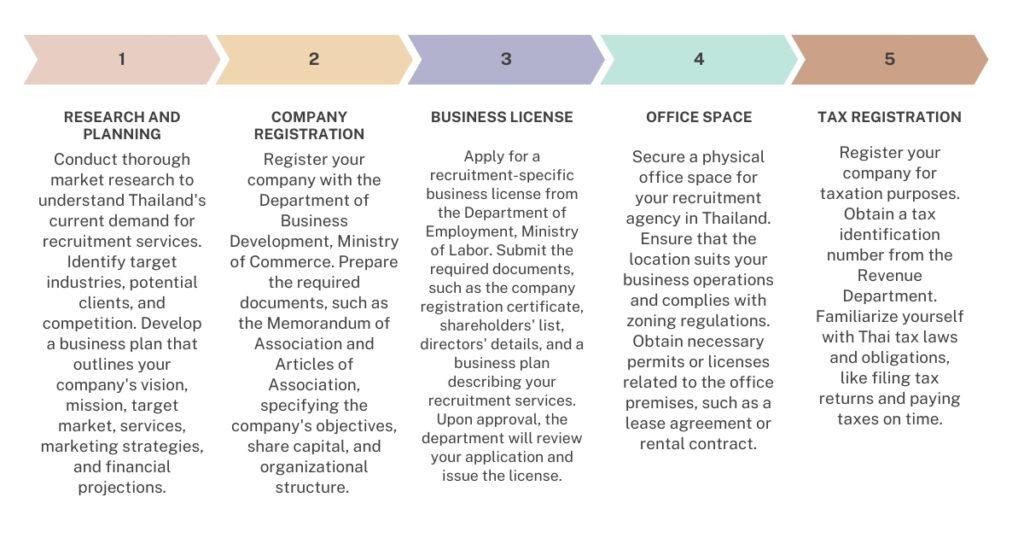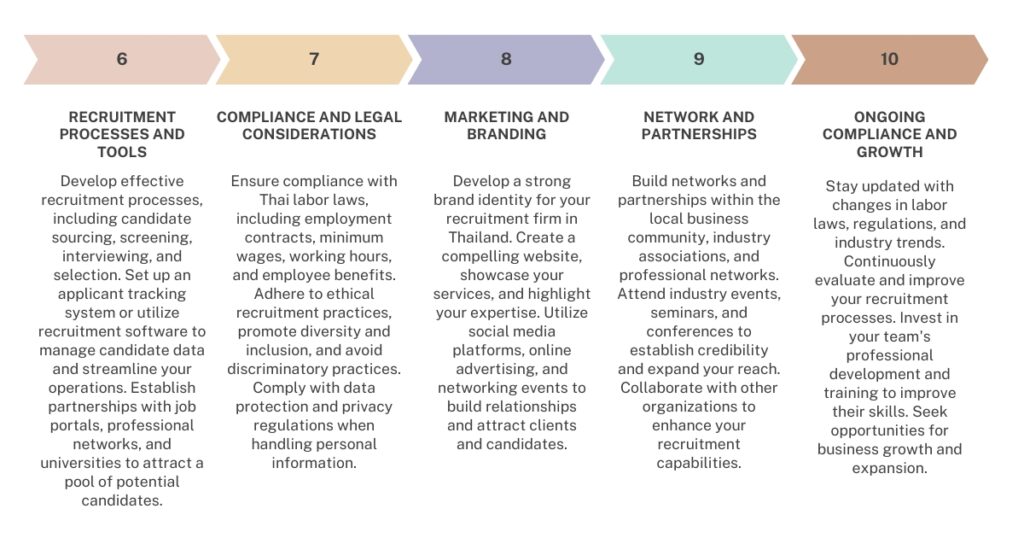Call us now:

Setting up a recruitment company in Thailand
Thailand’s rapid economic growth and attractiveness to foreign businesses mean that the demand for skilled workers across all industries is on the rise. If you are planning to create a recruitment company in Thailand, this is an extremely lucrative prospect. However, to succeed, you must thoroughly research the Thai business environment and the recruitment sector at the local level. In Thailand, which is becoming more dynamic and innovative than ever before, the demand for qualified specialists is greater than ever before.
Table of Contents
What are the regulations to create a recruitment company in Thailand ?
Despite Thailand is a common place to start up recruitment businesses, it has a range of regulations and legal frameworks, which have to be followed throughout this process :
Business Registration of the recruitment company :
Recruitment company registration is a first and crucial step to the establishment of recruitment agency in Thailand, as all companies shall register their business in Department of Business Development, Ministry of Commerce . E.g., Articles of Association, Memorandum of Association, and other documents shall be provided to support the registration process.
Business License :
When establishment of recruitment business in Thailand, it is critical to obtain business license in the recruitment industry. This type of license is issued by Ministry of Labour in Thailand . The documents that have to be provided are: Registration certificate, work of performance report form, recruitment services plan and business operation plan, etc.
Share Capital Requirements for your recruitment company :
Share capital for recruitment business is a non-fixed sum, as there is no restriction from the law on the amount of share capital, but enough share capital should be injected into the recruitment company, to cover all expenses which will be incurred at the beginning, including purchase of databases of candidates, staff salaries, office set-up costs, etc.
Employment Laws Requirements :
Thailand’s’ employment laws are a definitive source of recruitment company’s activity regarding employment contracts, wages and hours, employee benefits, occupational safety and social security contributions.
Work Permit Requirements for your recruitment company :
If any Western national will be hired, they should arrive in the country on Non-Immigrant B visa and work permit obtained on arrival in Thailand . Main documents which have to be submitted will be application form, copy of teaching certificate and social security payment plan.
Data Protection and Privacy :
Thailand has numerous regulations regarding collection, storage, usage and transmission of personal information.
Anti-Discrimination :
Thailand government promotes a strict non-discrimination policy based on nationality, gender, religion, race or disabilities . Thus, companies have to ensure the above will be respected.
Behavioral Ethics in your recruitment company :
Recruitment companies in Thailand have to ensure they follow a code of behavioral ethics, respecting candidates work, interests and privacy restrictions.
What are the legal requirements ?
To establish a recruitment company in Thailand necessitates fulfilling various lawful obligations. Six essential requirements require consideration:
According to the Civil and Commercial Code, you must register your business with the Department of Business Development within the Ministry of Commerce. This involves readying the company’s Memorandum of Association and Articles of Association, which outline the company’s aims, share capital, arrangement, and directing principles.
Business Permit :
Procuring a license particular to the recruitment industry is compulsory. One must petition for a permit from the Department of Employment under the Ministry of Labor. The application typically necessitates presenting the following documents: the company registration certification, shareholders’ roster and specifics of administrators, details of the recruitment services intended to be furnished, and a business plan outlining operations, marketing strategies, and financial projections.
Compliance with Labor Laws in your recruitment company :
As a recruitment agency for Thailand, adherence to Thailand’s labor laws is requisite, such as the Labor Protection Act. Familiarize yourself with the regulations regarding employment contracts, minimum wages, working hours, employee advantages, and termination procedures. Be certain recruitment processes observe fair employment practices and anti-discrimination laws.
Data Protection and Privacy :
Thailand has a Personal Data Protection Act governing personal data collection, use, disclosure, and protection. Guarantee candidates’ and clients’ personal information is handled in compliance with the law. Obtain consent for data processing, implement suitable security measures, and comprehend individuals’ rights regarding their data.
Work Permits for Foreign Employees :
If foreign staff members are to be hired, they must obtain work permits. This involves applying for Non-Immigrant B visas from Thai embassies or consulates abroad. Once the employees enter Thailand, their visas are converted into work permits through the Ministry of Labor. Comply with the procedures and regulations related to employing foreign workers.
Taxation and Accounting of your recruitment company :
Register your recruitment company for taxation purposes and acquire a tax identification number. Conform to Thailand’s tax regulations, such as filing tax returns and paying relevant taxes promptly. Maintain proper accounting records and financial statements in accordance with Thai accounting standards.
Therefore, it is essential to note that the specific legal requirements may fluctuate based on factors for example the recruitment company structure (e.g., private limited company, partnership) and the types of recruitment services offered. Consulting with legal and business professionals with expertise in Thai labor and business laws from our firm Benoit&Partners is recommended to ensure respect for the regulations and requirements.
How do you create a recruitment company in Thailand ?
Create a recruitment company in Thailand involves several steps. There are 10 steps to consider:


Free
consultation
How do I get a recruitment license ?
Here are the general steps to obtain a recruitment license in Thailand:
Step 1 – Prepare the required documents:
Collect the documents you need to include in your license application: recruitment company registration certificate, shareholders’ list, and details of the directors, Company’s Memorandum of Association and the Articles of Association, business plan outlining your recruitment service, target market, and marketing, financial statements or projections, office lease agreement or rental agreement.
Step 2 – Submit an application at the Department of Employment of the Ministry of Labor:
You can submit your application in person, or an authorized representative may submit on your behalf. The Ministry requires you to submit your application along with the properly prepared, signed, and notarized documents.
Step 3 – Application review:
The Department of Employment will review your application and assess your eligibility and suitability for a recruitment license in Thailand. The Department will verify your business plan, financial stability, and compliance with all the necessary requirements.
Step 4 – Site inspection of the recruitment company :
The Department of Employment may conduct a site inspection to determine if your office premises are suitable for a recruitment business. Ensure your office is set up correctly and complies with its specific requirements.
Step 5 – Payment of fees:
Pay the required application and licensing fees, according to the tariffs set by the Department of Employment. The fees depend on the type of recruitment service and the term you choose.
Step 6 – Declare to receive a license:
If your application is approved, you will receive a recruitment license from the Department of Employment. The license indicates the type of recruitment services you are entitled to provide, the validity term, and any additional requirements.
Step 7 – Comply and renew of your recruitment company :
After obtaining a recruitment license, you must comply with all the laws and regulations on recruitment services in Thailand.
